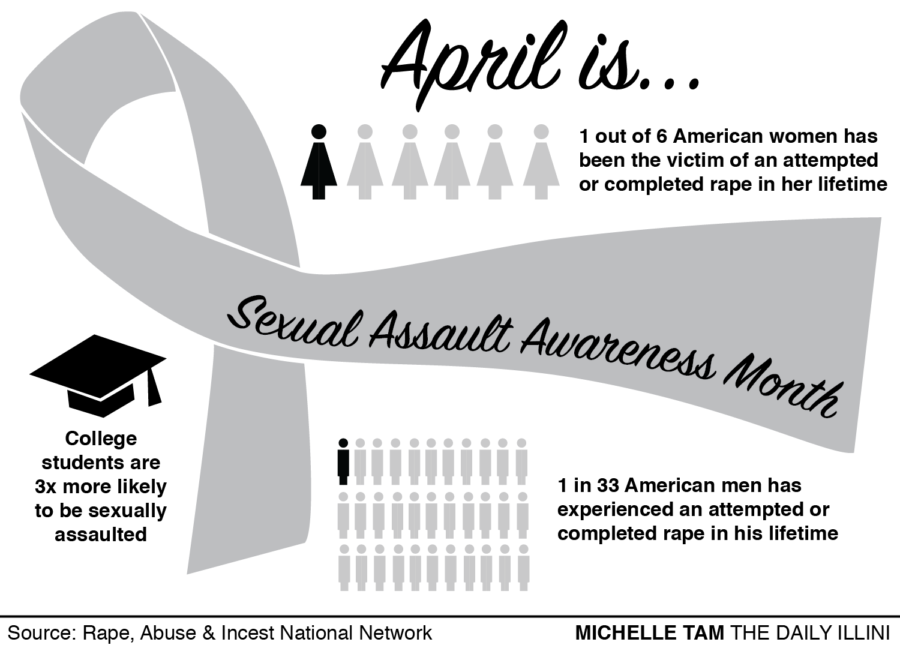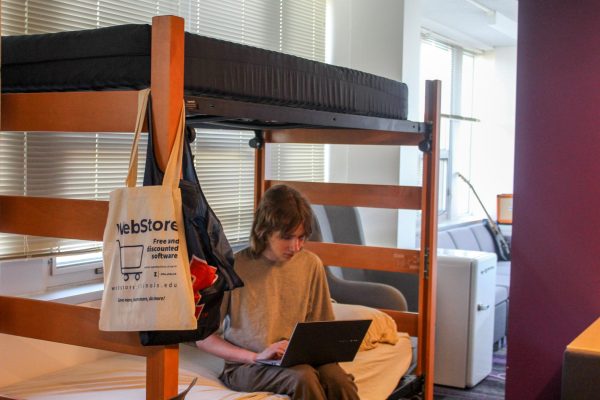Sexual Assault Awareness Month helps educate and provide support for students
Mar 27, 2016
On March 7, nearly 500 University students came together to take a stand against sexual assault.EJ In an attempt to save the University’s local rape crisis center, the Interfraternity Council and the Panhellenic Council joined forces and orchestrated a screening of “The Hunting Ground,” a documentary that addresses the mistreatment of sexual assault on college campuses.EJ In total, the Illini community raised more than $40,000.EJ
April was nationally recognized as Sexual Assault Awareness Month in 2001 when advocates for sexual assault awareness asked for a month apart from October, which is known as Domestic Violence Awareness Month.EJ This year’s campaigns focus on prevention.
According to the Rape, Abuse & Incest National Network, “one out of every six American women has been the victim of an attempted or completed rape in her lifetime” and “about three percent of American men — or one in 33 — have experienced an attempted or completed rape in their lifetime.”EJ To make matters worse, college students are three times more likely to be sexually assaulted.EJ
Get The Daily Illini in your inbox!
Throughout the month, campus organizations will hold various workshops, lectures and other events that highlight different aspects of sexual assault awareness. Almost all of the events are free and open to the public.EJ
Alexandra Davidson, senior in LAS, contributes to the cause through her multiple leadership roles: secretary and community service chair for Students Against Sexual Assault, FYCARE facilitator, ICARE facilitator, It’s On Us task force member and teaching assistant for the CARE class.EJ
SASA was formed last year when the president of the club, senior Lincy Pompilus, organized “It Happens Here,” an event where students could anonymously submit their personal encounters with sexual assault on campus.EJ “It Happens Here” will be held again this year on April 18 at 7:30 p.m. in SDRP 2025.EJ
“At UIUC, we sought to stand in solidarity with survivors, which resulted in a deeply powerful and moving evening of stories from students, staff and professors, including women, men and people from the LGBTQIA community,” Davidson wrote in an email.
SASA also pairs with other organizations such as the Women’s Resource Center and R.A.C.E.S., the local rape crisis center, to educate students through informational workshops such as “How to Be a Better Support System Workshop,” “Arts and Activism Workshop” and “Sexuality After Sexual Violence.”EJ Davidson hopes that these workshops will give students the support and knowledge that they need rather than make students feel alone.
“Society sends messages that blame survivors and discourage them from seeking services,” Davidson wrote. “Unfortunately, sexual assault is something that can happen anywhere and to anyone regardless of their gender identity or relationship status. It’s easy to think that sexual assault doesn’t happen in your town or community, but it does. Only with education and action can we prevent gendered violence.”
Sarah Graves, student in LAS and vice president of SASA, agrees that Sexual Assault Awareness Month is meant to give students a strong support system as well as educate others.EJ
“The most important thing we can do is to be strong bystanders,” Graves wrote via email. “Do not stand for language that simplifies rape in any way. Not jokes, slang, etc. In that way, you present yourself as someone that stands against sexual assault and stands for survivors. I would also tell them that if they don’t think they can personally intervene, that they should still do something. If something doesn’t feel right in your gut, get other people involved. We are a campus community, and we can stop sexual assault.”






